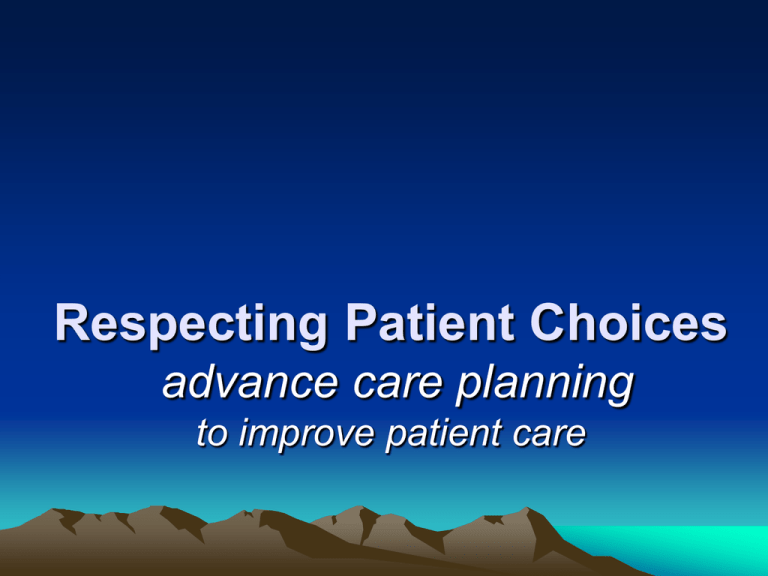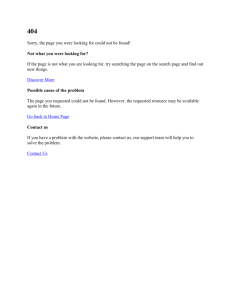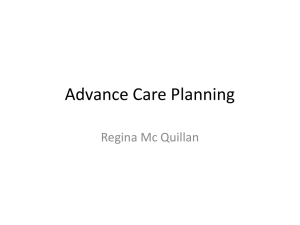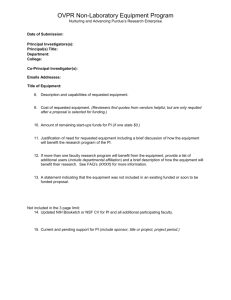Respecting Patient Choices advance care planning
advertisement

Respecting Patient Choices advance care planning to improve patient care Familiar scenarios • • • • • • A 93 yr mother with dementia, from a nursing home, in hospital for 6 weeks with # NOF An 84 yr mother, bedbound & unable to speak after a stroke, heading for a PEG and private hospital A 62 yr father with a terminal condition, who has requested NFR, is resuscitated (no form) A 70 year old man with severe COPD who has been admitted 8 times in the last year and offered NIV Multiple rest home and private hospital admissions direct to ED without communication with medical team for patients with a terminal illness Common factors: Choice? Communication? Family upset? Why is advance care planning important? • Most people (~ 85%) die after chronic illness, not a sudden event • Up to half of us are not in a position to make our own decisions when we are near death • • Our family have a significant chance of not knowing our views without discussion • A doctor who is uncertain about what to do, and who has to make a decision, will often treat aggressively (particularly if inexperienced and in acute care setting) • Many of us will be kept alive under circumstances that are not dignified, frequently suffering and in a way that we would not have wanted What is advance care planning? … ‘a process, whereby a patient, in consultation with health care providers, family members and important others, makes decisions about his or her future health care, should he/she become incapable of participating in medical treatment decisions’. • Ethical principles Peter Singer et al 1996 - autonomy - informed consent - dignity - prevent suffering The Victorian Experience • 1987- Dying with Dignity Inquiry of the Victorian Parliament – an extract: • The Committee is in agreement with the views of witnesses that a decision to allow hopelessly ill, suffering human beings to die naturally is a profound act of compassion. • Such decisions are morally appropriate with the deepest respect for life. • The Committee finds that good medical practice not only encompasses a duty of care, but also requires ongoing discussions with the patient and/or family in the formulation and implementation of clear not-for-resuscitation policies and guidelines, whenever possible. Medical Treatment Act 1988 Aim • to protect patient’s right to refuse unwanted Rx • to protect Drs who act in good faith re pt wishes • to recognise difficulties for Drs advising/guiding pts • to state clearly how pts can express treatment wishes • to encourage community/professional understanding re change of focus of Rx from cure to pain relief • to ensure that dying patients receive max relief Medical Treatment Act 1988 The main tools 1. Medical Enduring Power of Attorney 2. Refusal of treatment certificate – valid for current illness Yet the Office of the Public Advocate: low awareness & uptake Why have these attempts failed? • Not confronting problem of lack of communication between patients and doctors • Advanced Care Plans not easily accessible • Clinicians managing acutely unwell patient in hospital not aware of ACPs or of pt wishes • Not addressing the cultural resistance to discussing EOL care that is common to doctors, patients and their family • Prendergast TJ. Advance care planning: pitfalls, progress, promise. Crit Care Med. 2001; 29 suppl:N34-N39 A Successful Advance Care Planning Program • Respecting Choices® / • Community wide program La Crosse, Wisconsin • First applied to select patient groups in hospital then extended in the hospital and the community • Recognised as “best practice” by The [US] National Coalition on Health Care and The Institute for Health Care Improvement Respecting Choices: the result – Community results 2 years post implementation – 85% of patients who died had completed ACPs (increased from 15% pre-program) – 96% of ACPs were available in “the green sleeve” in patient medical records (increased from 4% pre-program) – In 98% of deaths the patient’s wishes, as stated in the ACPs, were followed – 100% no CPR 32% no hospitalisation – 18% no feeding tube 17% no ventilation Pilot study at the Austin Hospital • Funded by National Institute of Clinical Studies • Aug-Dec 2002: Trained 120 nurses, social workers, pastoral care workers, interpreters, some doctors • Piloted aged care, oncology, cardiology, nephrology, vascular & thoracic surgery • > 1000 Respecting Patient Choices discussions with patients/NOK • http://www.respectingpatientchoices.org.au The “Five Aims of RPC” • Initiate conversations with adults regarding views about future medical care • Assist individuals with advance care planning • Make sure plans are clear • Ensure plans are available • Appropriately follow plans Key Elements of the RPC Program • Train doctors and non-medical staff – 2 day training course – to discuss advance care planning • Implement system changes – medical records – process changes • Use existing tools of the Medical Treatment Act (Vic) 1988 – Medical Enduring Power of Attorney – Refusal of Treatment Certificate • Health professional education – GP education toolkit – RACGP and RACP website Pilot study evaluation: April 2003 300 patients in target areas • 63% of patients had a Green sleeve documented discussion around ACP • 68% of discussions resulted in documented request (advance care plan, documented request, NFR or combination) Pre-program • No ACPs and 10% with NFRs that were poorly completed Pilot study evaluation • ACPs: • 100% appointed medical enduring powers of attorney • 78% requested no life prolonging procedures if • “I will not be able to interact meaningfully with myself, my family, friends and environment” • • 82% want no CPR (52% at all, 30% depends on outcome) By August 49 (16%) patients had died 74% had a documented expression of treatment in their medical record Of all the medical records reviewed 95% of patients main wishes have been respected. Pilot study impact • Patients’ wishes were being respected and followed through: “I want to die at home and not return to hospital” “Please make sure that I die outside, under the stars” “If I deteriorate want to be kept dry but not resuscitated or admitted to ICU” Pilot study: impact • Patients recognise their right to make informed decisions now, as well as for the future: – "I want no further chemotherapy now", – "I would like to have the tracheostomy out now and to stop ventilation” – "I do not want the tracheostomy that is booked for tomorrow” – "I want no further transfusions" – "I want you to make me as well as possible so that I can get home for my daughter's 21st birthday before I die“ Impact on staff • `The program has allowed clear expression of patient’s wishes and has been a very useful addition to our clinical practice - one that ultimately allows our patients more control over their future treatment.’ Nephrologist 2005 • RPC has …empowered nurses to complete their care in an honest and supportive role to chronic patients who in the past thought we were hiding the issues from them. I don't believe we can we ever live without it!' Renal Nurse 2005 Introduced to 17 Hostels & Nursing Homes • Began February 2004, 2 year evaluation • 1108 residents • Median age 86 (range 31-101) • 76% female • 37% competent • 38% not competent • 25% uncertain What was the impact of RPC Program? • 51% of 1108 residents were introduced – Of 565 introduced, only 12 residents refused further discussion • Of those introduced 52% residents and/or families completed advance care plans – cf 3% of those not introduced (p < 0.0001) • 42% completed by resident • 58% completed by family on behalf of noncompetent resident What was requested? • 90% requested to receive no life-prolonging measures • 87% requested symptom and pain management • 34% requested to be cared for at the facility at end-of-life – 17% requested brief admission to hospital – 6% requested admission to hospital for aggressive treatment • Many other personal requests What were the outcomes? • 16% of residents died during the 2 year evaluation • 58% of the deceased residents had been introduced to RPC • Of these, 89% had advance care plans (ACP) – cf 42% of those not introduced to RPC (p < 0.0001) • 96-100% of their wishes were respected at EOL • 85% of those with ACPs received EOL care in their facility – cf 33% of those without ACPs (p < 0.0001) • Likelihood of dying in hospital is much greater without RPC introduction: 46% vs 18% (p=0.0002) CMDHB “Respecting Patient Choices” Strategy • To implement a strategy similar to that being introduced in Australia and pilot over 2 years • To employ 1FTE “clinician” to head the implementation of the plan and 0.1-0.3FTE “clinicians” from: palliative care, HSE, renal, respiratory, cardiology, surgery CMDHB “Respecting Patient Choices” Strategy • Contract Austen Hospital Team to train staff and support set-up and monitoring requirements • Implement key components of RPC programme • Evaluate efficacy of programme using same tools as Australia and compare outcomes across 2 countries • If effective evolve national strategy for NZ and develop more robust business case for future Challenges/obstacles • Good idea; ALL agree that the outcomes are likely to be positive, including cost savings, BUT: – Difficulty with less can be better! – Whose budget – Where is it most appropriate • Primary care • Resthomes/private hospitals • Secondary/tertiary care hospitals






